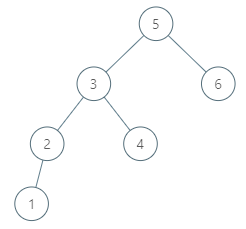Given a binary search tree and a node in it, find the in-order successor of that node in the BST.
The successor of a node p is the node with the smallest key greater than p.val.
You will have direct access to the node but not to the root of the tree. Each node will have a reference to its parent node.
Example 1:

Input: root = {"$id":"1","left":{"$id":"2","left":null,"parent":{"$ref":"1"},"right":null,"val":1},"parent":null,"right":{"$id":"3","left":null,"parent":{"$ref":"1"},"right":null,"val":3},"val":2} p = 1 Output: 2 Explanation: 1's in-order successor node is 2. Note that both p and the return value is of Node type.
Example 2:

Input:
root = {"$id":"1","left":{"$id":"2","left":{"$id":"3","left":{"$id":"4","left":null,"parent":{"$ref":"3"},"right":null,"val":1},"parent":{"$ref":"2"},"right":null,"val":2},"parent":{"$ref":"1"},"right":{"$id":"5","left":null,"parent":{"$ref":"2"},"right":null,"val":4},"val":3},"parent":null,"right":{"$id":"6","left":null,"parent":{"$ref":"1"},"right":null,"val":6},"val":5}
p = 6
Output: null
Explanation: There is no in-order successor of the current node, so the answer is null.
Example 3:

Input: root = {"$id":"1","left":{"$id":"2","left":{"$id":"3","left":{"$id":"4","left":null,"parent":{"$ref":"3"},"right":null,"val":2},"parent":{"$ref":"2"},"right":{"$id":"5","left":null,"parent":{"$ref":"3"},"right":null,"val":4},"val":3},"parent":{"$ref":"1"},"right":{"$id":"6","left":null,"parent":{"$ref":"2"},"right":{"$id":"7","left":{"$id":"8","left":null,"parent":{"$ref":"7"},"right":null,"val":9},"parent":{"$ref":"6"},"right":null,"val":13},"val":7},"val":6},"parent":null,"right":{"$id":"9","left":{"$id":"10","left":null,"parent":{"$ref":"9"},"right":null,"val":17},"parent":{"$ref":"1"},"right":{"$id":"11","left":null,"parent":{"$ref":"9"},"right":null,"val":20},"val":18},"val":15} p = 15 Output: 17
Example 4:

Input: root = {"$id":"1","left":{"$id":"2","left":{"$id":"3","left":{"$id":"4","left":null,"parent":{"$ref":"3"},"right":null,"val":2},"parent":{"$ref":"2"},"right":{"$id":"5","left":null,"parent":{"$ref":"3"},"right":null,"val":4},"val":3},"parent":{"$ref":"1"},"right":{"$id":"6","left":null,"parent":{"$ref":"2"},"right":{"$id":"7","left":{"$id":"8","left":null,"parent":{"$ref":"7"},"right":null,"val":9},"parent":{"$ref":"6"},"right":null,"val":13},"val":7},"val":6},"parent":null,"right":{"$id":"9","left":{"$id":"10","left":null,"parent":{"$ref":"9"},"right":null,"val":17},"parent":{"$ref":"1"},"right":{"$id":"11","left":null,"parent":{"$ref":"9"},"right":null,"val":20},"val":18},"val":15} p = 13 Output: 15
Note:
- If the given node has no in-order successor in the tree, return
null. - It's guaranteed that the values of the tree are unique.
- Remember that we are using the
Nodetype instead ofTreeNodetype so their string representation are different.
Follow up:
Could you solve it without looking up any of the node's values?
Difficulty:
MediumLock:
PrimeProblem Solution
510-Inorder-Successor-in-BST-IIAll Problems:
Link to All Problems
All contents and pictures on this website come from the Internet and are updated regularly every week. They are for personal study and research only, and should not be used for commercial purposes. Thank you for your cooperation.